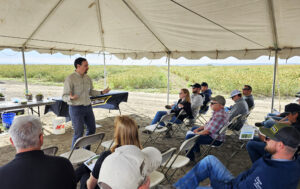Hosting Customer Visits on Farms is Key to Regen Ag Success
(Sponsored) Cameron Ogilvie is eager to share the science behind regenerative farming systems. He creates interactive demonstrations so more people can get their hands in the soil. In addition to raising awareness about regen ag, Ogilvie also understands that he’s cultivating connections.

The soil health expert delivers educational programs for food companies, farmers, and agronomists on soil and its impact on farming systems. Ogilvie has been leading the regenerative agriculture education program with McCain Foods over the past two years. When McCain committed to sourcing all potatoes from farms practicing regenerative techniques by 2030, they partnered with the Soil Health Institute, a global nonprofit committed to safeguarding and enhancing the vitality and productivity of soil through scientific research and advancement.
McCain customers, including fast food restaurant chains, visit potato farms on Field Days to dialog with the growers, to engage with the experts who are involved in these projects, and to meet the teams working in regenerative agriculture. As Ogilvie puts it, “Customers literally want to come and get their hands dirty!”
That was their experience in September in Burley, Idaho, where grower Austin Poulson of Scott Poulson Farms is experimenting and innovating with some new practices. During that visit to Austin’s farm, customers had a hands-on experience, learned about soil health, and interacted with the farmer growing their potatoes, who has been trying some new reg ag practices.
Rather than incorporating a cover crop and mixing it into the soil in the fall, Scott Poulson Farms left that cover crop in the field and brought in sheep to graze. Poulson saw great results. Over the winter, when the snow melted, the water drained into the soil better where the cover crop had been left alone and where the sheep had grazed it. Ogilvie said, “For me, that makes complete sense: the less that we disturb the soil, the more we keep the pores, the root channels, the earthworm channels, and those allow water to drain and infiltrate into the soil.” Visiting farms helps customers to grow their understanding of agricultural and environmental challenges and learn to appreciate the forward-thinking efforts growers are making to produce quality crops.
Ogilvie explains, “My job is to illustrate the difference Austin’s efforts make, with demonstrations showing the impact of soil management on soil functions, including infiltration, carbon sequestration, resilience to compaction and to extreme weather events. I saw a lot of great engagement. The main feedback was the Field Day made the story come alive for this customer. And I love that. It’s great to be a part of that success.”
 Embracing regenerative agriculture will require commitments throughout the supply chain and multiple avenues to reach successful outcomes. As Ogilvie notes, “A holistic approach to regenerative agriculture is a combination of soil health management practices, new varieties of potatoes, supportive partnerships, and the financials in place. Customers are absolutely growing in their understanding that there is so much potential to improve soil health, reduce greenhouse gas emissions, and create resiliency within our supply chains. That’s an important message for everyone who has a stake in potatoes.”
Embracing regenerative agriculture will require commitments throughout the supply chain and multiple avenues to reach successful outcomes. As Ogilvie notes, “A holistic approach to regenerative agriculture is a combination of soil health management practices, new varieties of potatoes, supportive partnerships, and the financials in place. Customers are absolutely growing in their understanding that there is so much potential to improve soil health, reduce greenhouse gas emissions, and create resiliency within our supply chains. That’s an important message for everyone who has a stake in potatoes.”
He particularly understands the value of in-person farm visits to deepen relationships.
“There are a lot of actors in the value chain. The more we can connect everybody, the better we can achieve our sustainability goals — from the consumer to the customer to the potato growers.” McCain looks forward to welcoming more customers to farms practicing regen ag in Crop Year 2024.
You can meet Ogilvie and learn more about soil health and potato systems when the Soil Health Institute presents at the Potato Expo in Austin, Texas: “Soil Health in Potatoes: Fry in the Sky or Grounded in Reality?” on Thursday, January 11, 2024.







